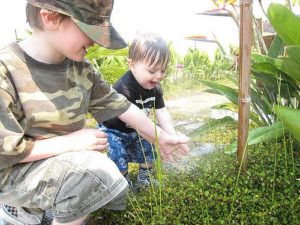Stop and Smell the Roses
 I recently came across this quote that resonated with the blog that I wrote last month about parents of twins feeling overwhelmed times two. Psychoanalyst Dr. Steven Mitchell, on p. 147 of his book Hope and Dread in Psychoanalysis (Basic Books, 1993), wrote these words:
I recently came across this quote that resonated with the blog that I wrote last month about parents of twins feeling overwhelmed times two. Psychoanalyst Dr. Steven Mitchell, on p. 147 of his book Hope and Dread in Psychoanalysis (Basic Books, 1993), wrote these words:
When my older daughter was about two or so, I remember my excitement at the prospect of taking walks with her, given her new ambulatory skills and her intense interest in being outdoors. However, I soon found these walks agonizingly slow. My idea of a walk entailed brisk movement along a road or path. Her idea was quite different. The implications of this difference hit me one day when we encountered a fallen tree on the side of the road. . . . The rest of the “walk” was spent exploring the fungal and insect life on, under, and around the tree. I remember my sudden realization that these walks would be no fun for me, merely a parental duty, if I held onto my idea of walks. As I was able to give that up and surrender to my daughter’s rhythm and focus, a different type of experience opened up to me. . . . If I had simply restrained myself out of duty, I would have experienced the walk as compliance. But I was able to become my daughter’s version of a good companion and to find in that another way to be that took on great personal meaning.
This paragraph describes so beautifully how parents strive to reframe their own needs and desires in the service of nurturing their children. When we can shift our focus without tremendous feelings of resentment and sacrifice, we enter into a mutually satisfying shared experience with our children. I believe that, in order to do this successfully, we have to give up the ideal of being an all-understanding and all-giving parent. If not, we are prone to experience tremendous disillusionment and exhaustion along with a diminished capacity for empathy.
I remember well the times that I felt absolutely overwhelmed and suffocated by my children’s needs. At those moments, I shifted into a self-state that made me wholly available to them. I told myself that I needed to be present in this way at that moment; however, I reassured myself that this state would be temporary and finite, and that I would recover my self in due time.
My training as a psychotherapist has helped me develop this emotional flexibility. The ability to stay in contact with your own feelings and simultaneously shift into another self-state to address another’s emotional or physical needs is an important parenting requisite. Rather than feeling as if we must surrender or submit, our parental ability to enter into the world of another and attend to issues in a balanced manner will encourage and enhance the quality of the shared experience. It is akin to slowing down, relaxing, and enjoying the moment—so challenging to accomplish in the course of our very busy lives.
Image courtesy of Neeta Lind CC by 2.0

